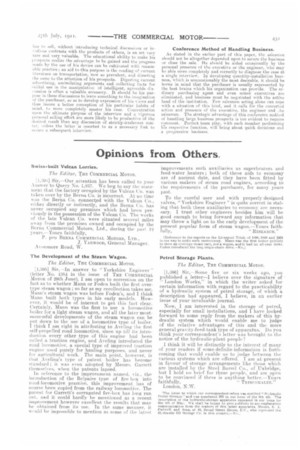Opinions from Others.
Page 17

If you've noticed an error in this article please click here to report it so we can fix it.
Swiss-built Vulcan Lorries.
The Editor, THE COMMERCIAL MOTOR.
!,1,:i9 I] Sir,—Our attention has been called to your Answer to Query No. 1,837, We beg to say the stateinent that the factory occupied by the Vulcan Co. was taken over by the Berna Go. is incorrect. At no time was the Berna Co. connected with the Vulcan Co., either directly or indirectly, and the Berna Co. has never occupied any premises which had been previously in the possession of the Vulcan Co. The works of the late Vulcan Co. were situated several miles ;ie ay from the premises owned and occupied by the Berna Commercial Motors, Ltd., during the past 12 years.—Yours faithfully,
P. pro BERNA COMMERCIAL MOTORS, LTD., J. YARWOOD, General Manager. A vomnore Road, W.
The Development of the Steam Wagon.
The Editor, THE COMMERCIAL MOTOR.
LI,3951 Sir, --In answer to " Yorkshire Engineer " (letter No. 1384 in the issue of THE COMMERCIAL MOTOR of 29th June), I am open to correction on the fact as to whether Mann or Foden built the first overtype steam wagon ; so far as my recollection takes me, Mann's steam wagon was before Foden's, and I think Mann built both types in his early models. However, it would be of interest to get this fact clear. Certainly, Mann was the first to use a locomotive boiler for a light steam wagon, and all the later mostsuccessful developments of the steam wagon can be put down to the use of a locomotive type of boiler. I think I ain right in attributing to Aveling the first self-propelled road locomotive, since up till its introduction every other type of this engine had been called a traction engine, and Aveling introduced the road locomotive, a special type of improved traction engine used purely for hauling purposes, and never for agricultural work. The main point, however, is that Aveling's type of patent, boiler has become standard ; it was even adopted by Messrs. Garrett themselves, when the patents lapsed.
To reference to the improvement named, viz., the introduction of the Belpaire type of firebox into road-locomotive practice, this improvement has of course been copied from the railway locomotive. The patent for Garrett's corrugated fire-box has long run out, mid it could hardly he mentioned as a recent improvement however excellent the results that ma' he obtained from its use. In the same manner, it would he impossible to mention as some of the latest
improvements such auxiliaries as superheaters and feed-water heaters; both of these aids to economy are of ancient date, and they have been fitted by various makers of steam road engines, according to the requirements of the purchaser, for many years past.
To the careful user and with properly-designed valves, "Yorkshire Engineer" is quite correct in stating that both these auxiliaries to economy are necessary. I trust other engineers besides him will be good enough to bring forward any information that may throw a light, on to the early development of the present popular form of steam wagon.—Yours faith fully, " RESEARCH."
(Reference to the reports on the Liverpool Trials of PK 1599 and 1801 is one way to settle such controversy. Mann was the first maker publicly to show an overtype steam cart, nut a wagon, and it lad an all-gear drive.
Foden introduced the long singlemhain
Petrol Storage Plants.
The Editor, THE COMMERCIAL MOTOR.
[1,396] Sir,—Some five or six weeks ago, you published a letter—I believe over the signature of • " London Works," in which the writer asked for certain information with regard to the practicability
of a hydraulic system of petrol storage, of which a description had appeared, I believe, in an earlier issue of your invaluable journal.
Now, I am interested in the storage of petrol, especially for small installations, and I have looked forward to some reply from the makers of this hy draulic system which would enable me to judge of the relative advantages of this and the more general gravity-feed-tank type of apparatus. Do you think your correspondent's letter was brought to the notice of the hydraulic-plant people ?
I think it will be distinctly to the interest of many of your readers if some definite information is forth
coming that would .enable us to judge between the various systems which are offered. T am at present in favour of storage arrangements like those which are installed by the Steel Barrel Co., of Uxbridge, but I hold no brief for these people, and am open to be convinced if there is anything better.—Yours
faithfully, " TRENTOMALEE." London, N.W.
"The letter to which our correspondent refers was entitled " Hydraulic Petrol Storage." and was numbered 876 in our issue of the 5th nit The description of the hydraulic-storage apparatus appeared in our issue for the 4th at May. We shall ha happy to give publicity to any explanatory communication from the makers of this latter apparatus, Messrs. Si. A. {Indwell and Sons, of 40, Broad Street House, E C., who represent the Hydraulic Oil Storage Co. in this country.–Fm._




















